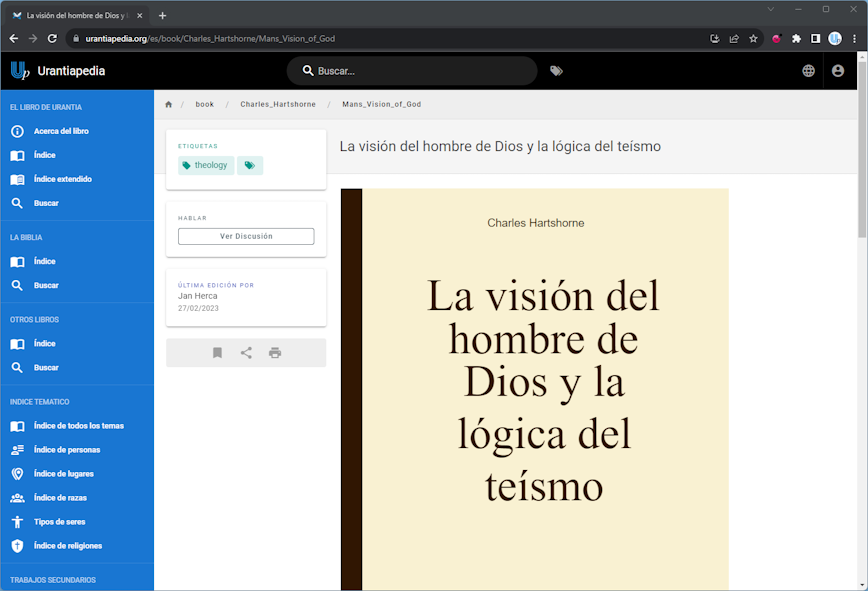Urantiapedia will contain a library of books on spirituality, religion, philosophy and science, provided we consider them to be of some interest to readers of The Urantia Book, and provided we can obtain a copyright-free version.
The reason for this library is found in the teachings of The Urantia Book itself. In paper 52 it is suggested to us that the second adjustment that the world must make to achieve a global social brotherhood is a greater knowledge of the literature of other nations:
“2. Intellectual cross-fertilization. Brotherhood is impossible on a world whose inhabitants are so primitive that they fail to recognize the folly of unmitigated selfishness. There must occur an exchange of national and racial literature. Each race must become familiar with the thought of all races; each nation must know the feelings of all nations. Ignorance breeds suspicion, and suspicion is incompatible with the essential attitude of sympathy and love.” UB 52:6.4
We the Urantiapedia board understand these suggestions as a clear indication that we must create a library of texts from all the nations of the world that collect the best thoughts and feelings of each one, so that this knowledge eliminates the usual suspicions that exist today between followers of different religious or ideological currents.
Furthermore, there is an exceptional paper in The Urantia Book, paper 130, which includes a completely unknown passage from the life of Jesus until the arrival of the Fifth Revelation. For a few weeks, Jesus and a boy from India whom he had as a pupil, compiled a collection of religious texts in the library of Alexandria.
“Under Jesus’ direction Ganid made a collection of the teachings of all those religions of the world which recognized a Universal Deity, even though they might also give more or less recognition to subordinate deities. After much discussion Jesus and Ganid decided that the Romans had no real God in their religion, that their religion was hardly more than emperor worship. The Greeks, they concluded, had a philosophy but hardly a religion with a personal God. The mystery cults they discarded because of the confusion of their multiplicity, and because their varied concepts of Deity seemed to be derived from other and older religions.” UB 130:3.5
For Urantiapedia board this passage is extremely inspiring, and is a reflection of what we want to create. In the same way that the famous library of Alexandria helped Jesus and his pupil gain a clearer view of the beliefs that existed at that time about the Deity, in the same way we want to create a library of writings that will help readers of this generation and future generations to better understand current beliefs about Deity and about the big issues in spirituality, religion, philosophy and science.
Finally, we also want to bring into consideration that The Urantia Book itself indicates in two paragraphs (UB 0:12.12, UB 121:8.13) that for the writing of the book the revealers have widely used classic authors and literature already existing at the time of the revelations. The objective of this use by the revelators was to create a text that was better adapted to the form of human expression and the concepts existing at the time the revelations were given (UB 121:8.12). These texts were never used literally and no reference to them is offered. Finding these texts used by the revelators is an arduous task. One reader, Matthew Block, has done an exceptional job trying to find them and he details his findings to date on a website: https://urantiabooksources.com/. Other readers have done similar works. The intention we have at Urantiapedia is to offer in this library all those books that some readers are considering as supposedly used by the revelators. We do not want anyone to think that with the inclusion of these books we are saying that without a doubt these books were used in the revelation, but rather that they are being considered as possible used books. The intention of this website is to offer all the information available. It is the job of the readers to add in the Articles section those studies that try to verify the possible influence or not on the revelators of these texts.
When adding these books into Urantiapedia we are going to proceed in the same way as with the Bible, creating specific pages for each book, with each chapter on one page. Cross-references between the books and The Urantia Book will then be added, just as has been done using the Bible and the Paramony.
¶ Item List

¶ References
- Copyright-free books
- Studies on books supposedly used by revelators
- Early Jewish Writings
- Early Christian Writings
- Pseudepigrapha.com
- Judeo-Christian apocryphal books
- Religious books of Judaism
- Religious books of Christianity
- Gnostic religious books
- Islamic religious books
- Religious books of Buddhism
- Religious books of Hinduism
- Religious books of Taoism
- The I Ching
- Shinto religious books
- Religious books of Bahaism
- Religious books of Zoroastrianism
- Jain religious books
- Religious books of Sikhism